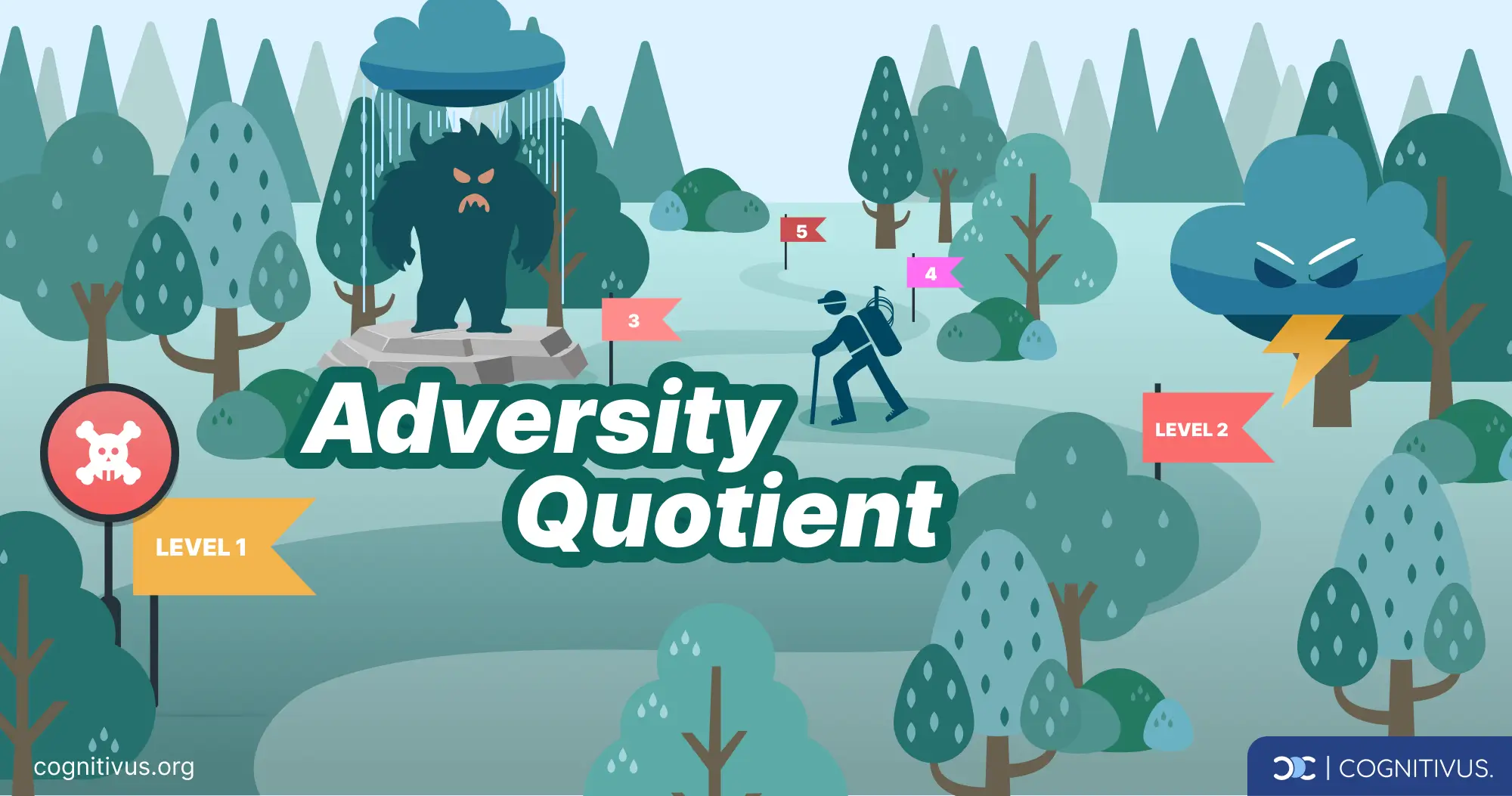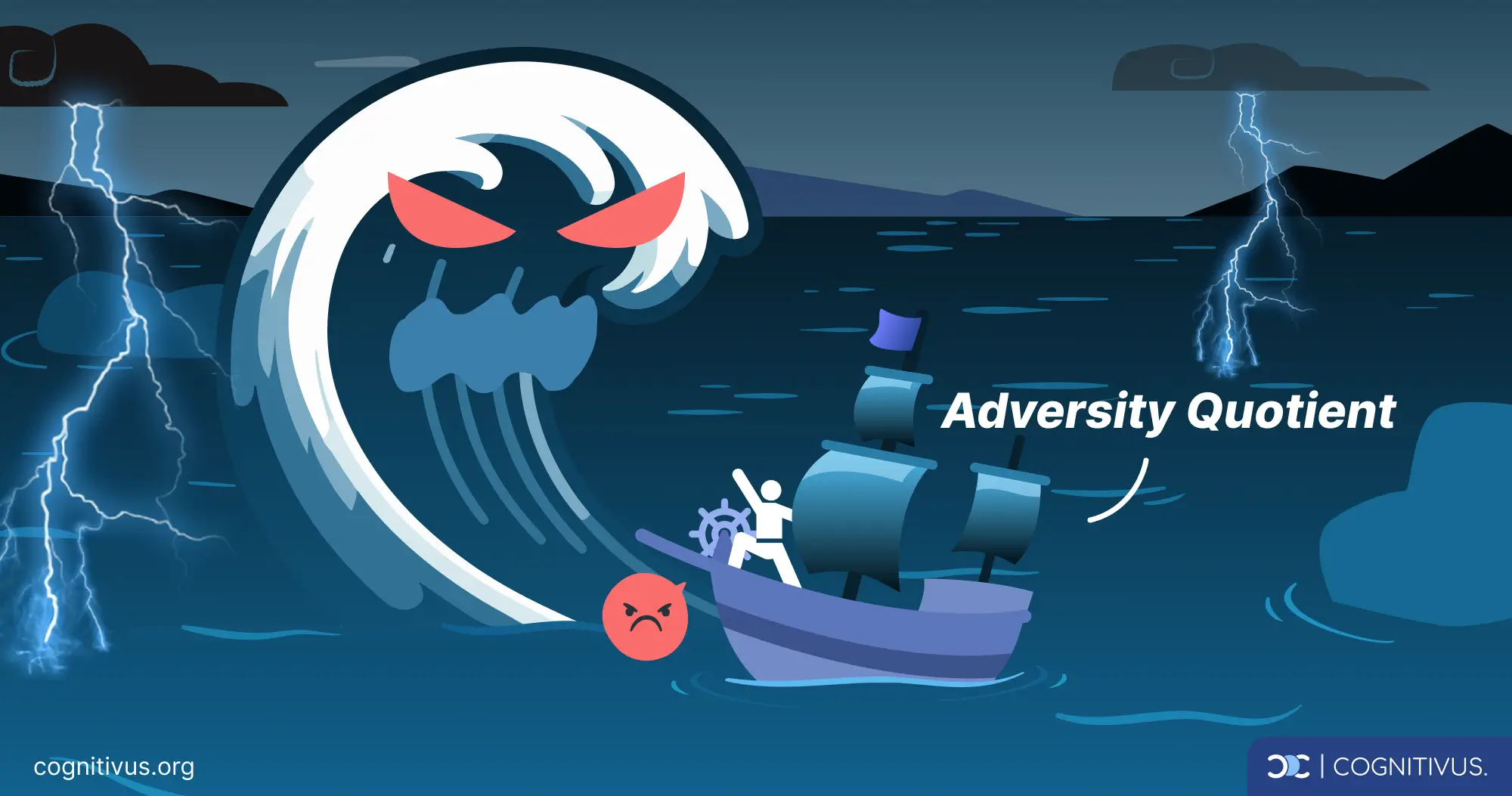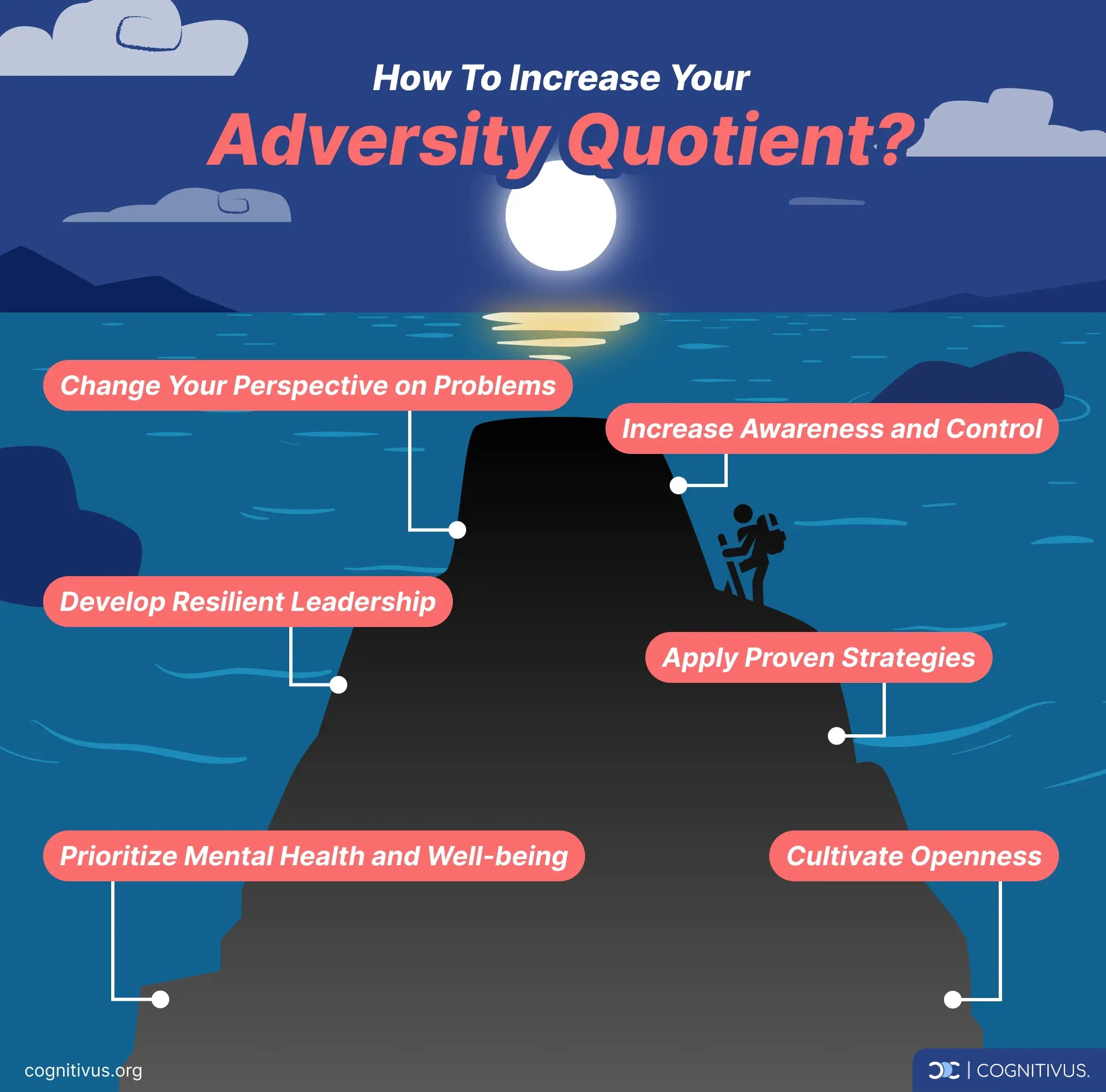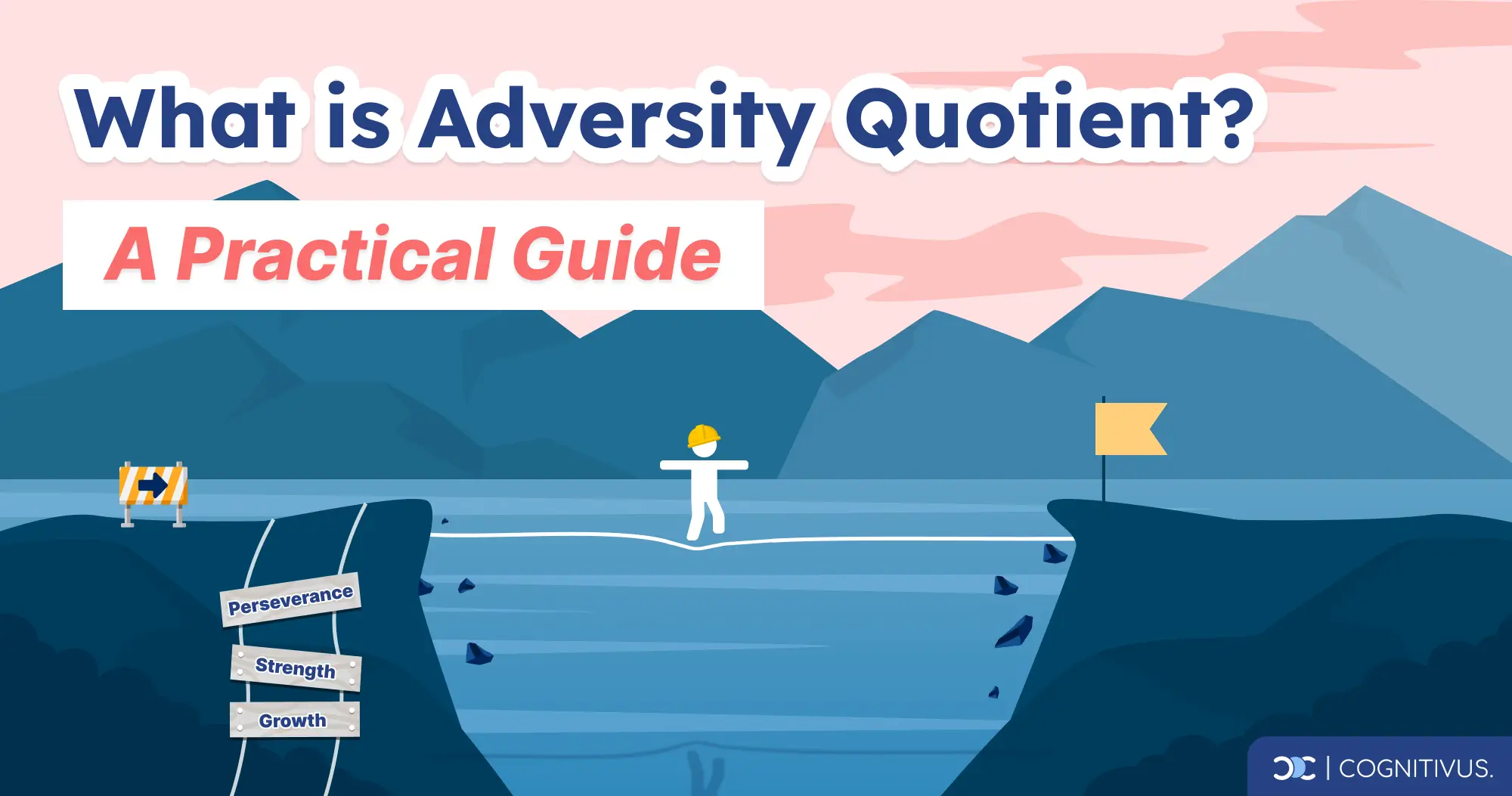1. What Is Adversity Quotient?
We all deal with life’s challenges differently. For some, trials and tribulations create inner strength and resilience, but they can also lead to havoc and distress for others.
So why do some people have the innate ability to rise after struggles while others can’t? It all comes down to our adversity quotient, which measures how much resilience, adaptability, and flexibility you have when facing problems.
Building a high adversity quotient or ‘AQ’ allows you to problem-solve, adopt different perspectives, and rise from failure.
To learn all about the benefits of having a strong AQ, the following guide delves into what your adversity quotient is along with steps to boost your very own resilience.

Why adversity quotient matters
Think about a time you had to deal with an incredibly hard challenge in your life. Everything you did to work through it indicates your adversity quotient or AQ. You could think of AQ as representing your resilience, but it’s actually a multifaceted measure of how we handle adversity, including the steps we take to adapt and persevere.
So, how do you know how much resilience and adaptability you have, and why does it matter?
In terms of measuring AQ, it goes beyond the use of cognitive assessments to test IQ or the way we evaluate emotional intelligence or EQ. Instead, researchers focus on your practical adaptability in the face of unexpected challenges.
Dr. Paul Stoltz introduced this concept in his groundbreaking 1997 book, "Adversity Quotient: Turning Obstacles into Opportunities.” According to Stoltz, AQ is a predictor of one's ability to persevere. He believes that AQ is not fixed but a malleable skill that we can develop and strengthen over time, provided we incorporate the right strategies.
If your AQ isn’t where you want it to be, you can transform challenges into stepping stones for success when you know how to get there.
How important is adversity quotient in success?
We know that you need to have a high Adversity Quotient to cope with stress, but it also equips you with the skills and knowledge not to see adversity as a setback but as an experience from which you can learn and grow. This allows you to shift your perspective so you can change your approach to life’s hurdles.
Not only can a high AQ help you bounce back when things get tough, but it also allows you to embrace change, maintain control, and problem-solve. With time, you’ll notice significant improvements in your mental well-being and workplace productivity.
But the question is, how can we use AQ to achieve success?
According to psychological and behavioral studies, AQ is at the forefront of achieving success. For example, Frontiers, the online psychology journal, found that both AQ and EQ (Emotional Quotient) impacted career success because they directly contributed to job performance and organizational commitment. That’s because individuals with high AQ and EQ are better equipped to work through difficulties such as failure and conflict in the workplace.
Another factor to consider is that a strong AQ makes it possible to leverage adverse situations to your advantage. When facing obstacles, high AQ will drive innovative ways of thinking, growth, and leadership.
In her TED talk, Natalie Fratto, a venture investor and VP at Goldman Sachs, concluded that AQ measures how flexible you are in the midst of change. If you were to start a business, AQ would influence your potential success more than traditional IQ.
A senior lecturer at the MIT Sloan School of Management, Otto Scharmer, reiterated this sentiment in his TED Talk. He stated that open-mindedness and an eagerness to learn are necessary to adapt to a fast-changing world. This approach aligns with having a high AQ and successfully overcoming life’s uncertainties.
When you know how to harness the power of AQ, you can do what it takes to thrive, regardless of what life throws at you. This is the essence of a high adversity quotient.
2. How to Measure Your Adversity Quotient?
Do you really know how equipped you are to deal with life’s ups and downs? Well, your adversity quotient can give you a better idea of your mental strength and ability to adapt to change. Dr. Paul Stoltz makes this process easier by breaking down the tools you need to quantify your level of resilience against obstacles. These tools assess your reactions to stress-inducing scenarios, offering insight into how you manage setbacks.
In Stoltz’s book “GRIT: The New Science of What It Takes to Persevere, Flourish, Succeed,” he describes a method known as the GRIT Gauge™, which measures your tenacity. It also provides personalized feedback on improving your resilience.
This tool evaluates your responses and reveals whether you have a low AQ, which often leads to giving up in the face of failure, or a high AQ indicative of problem-solving when challenges arise.
When you take the time to explore your overall resilience through valid psychological scales, it will offer a deeper insight into your adversity quotient.
Tools like the Resilience Scale for Adults (RSA) and the Connor-Davidson Resilience Scale (CD-RISC) assess different aspects of resilience, such as personal competence and acceptance of change.
On another note, Fratto believes that AQ can be assessed through your eagerness to explore “what if” scenarios. She says you can further evaluate your AQ based on your ability to “unlearn” outdated or irrelevant assumptions. This can provide a more refined understanding of your ability to adapt.
3. The Benefits of High Adversity Quotient
You’re aware that a high AQ is what you can rely on during some of the most challenging times in your life. But apart from strengthening your resilience, you might not know that a high AQ can support good leadership skills and help you facilitate positive change at a community level.
Let’s learn about the benefits of developing your adversity quotient based on business leadership and society at large.

Why high adversity quotient is important for leadership
The purpose of a leader is to direct and inspire their team, much like the captain of a ship confidently navigating through a storm. This is how you could see someone with a high adversity quotient. A strong AQ allows you to lead by example, which shows others that a challenge is not a roadblock but a pathway to innovation and growth. This type of resilience and positivity, despite a crisis, distinguishes a successful leader from the rest.
The former chairman and CEO of DocuSign, Keith Krach, outlined this perfectly. He said that a high AQ can significantly enhance a leader’s IQ and EQ. The interplay of these quotients allows leaders to focus on their personal development while motivating others.
High AQ as a leader instills confidence and facilitates agile ways of thinking, which means they’re equipped to change their thought processes based on different situations. So, when things are uncertain, high AQ leaders can switch their thinking and adapt to their environment. This encourages employees to take calculated risks where learning from failure is valued as much as celebrating success.
Furthermore, this approach creates a resilient culture within businesses and organizations, driving them towards continuous growth and achievement.
Why high adversity quotient is important in society
From individual growth and achievements to inspirational leadership, it’s safe to say that a strong AQ is incredibly beneficial for personal and professional success. But, on a broader scale, AQ influences society. The cultivation of high AQ among individuals can create collective success. This means that at a community level, a high AQ helps people adapt more effectively to change and recover swiftly from setbacks.
In these types of communities, people see obstacles as catalysts for positive change. This perception helps them come together to overcome crises on an economic, environmental, and social scale. Everyone develops a true sense of cultural resilience, which helps them deal with challenges creatively rather than out of fear.
One of the most powerful benefits of high societal AQ is that it creates opportunities for all individuals. That’s because it values different perspectives and each person’s unique contributions. When people aren’t afraid to face adversity, they’re willing to resolve problems by trying new solutions.
Research published in the Journal of Social Work and Science Education has shown how AQ within the educational sector contributes to overcoming adversities, highlighting its pivotal role across broader societal structures.
Ultimately, high AQ has measurable effects on society, such as increased happiness due to perceived control over one's life, economic stability as businesses evolve, and enhanced well-being as individuals and communities thrive in tough situations.
4. How to Increase Your Adversity Quotient?
Now that you know how to measure your AQ, can you increase it if it isn’t where you want it to be? Yes! Your AQ can be developed and improved with time and practice.
Change your perspective on problems
You can start by confronting the way you interpret and approach problems. Rather than see obstacles as the end of the road, try to see them as opportunities to learn and grow.
Increase awareness and control
Based on Dr. Stoltz’s core components, you can strengthen your AQ by increasing your awareness of events within your control, taking ownership of your responses to failure, and understanding how much adversity affects your life. The next step is to work on your ability to see challenges through to the end.
Develop resilient leadership
When business leaders focus on improving their AQ, it helps them guide their teams through stressful and challenging periods. By embodying resilience and strength, they create a resilient organizational culture.

Embrace strategies from Dr. Stoltz
Dr. Stoltz’s book "Adversity Quotient at Work: Finding Your Hidden Capacity for Getting Things Done” introduces strategies that can help you cultivate a resilient leadership style. By embracing the principles of AQ, you can utilize intelligence and emotions to guide your organization through difficulties, emerging stronger on the other side.
Prioritize mental health and well-being
Increasing your AQ also means prioritizing your mental health while developing resilience, as outlined by the American Psychological Association. Pay attention to the quality of your relationships, focus on your well-being, find purpose through helping others, and always remain realistic but hopeful. These steps support your personal growth and empower you to navigate adversity with a positive mindset. Setting achievable goals and building healthy connections can increase your AQ, so you’re better prepared to overcome future hurdles.
Cultivate openness
Based on Scharmer's TED Talk, increasing AQ involves cultivating openness and a willingness to embrace diverse perspectives. This process helps you build a future where qualities such as adaptability and learning are valued over a single area of expertise.
Conclusion
Your AQ represents your ability to cope with and overcome stressful and often distressing situations. The higher your AQ, the more tools you have to deal with sudden changes and difficulties when they come your way.
We know that developing a strong sense of resilience makes you more adaptable and unlikely to accept defeat when you fail or encounter a problem.
By following the steps to increase your adversity quotient, you can work towards your personal and career goals with a new sense of inner strength, motivation, and insight.


